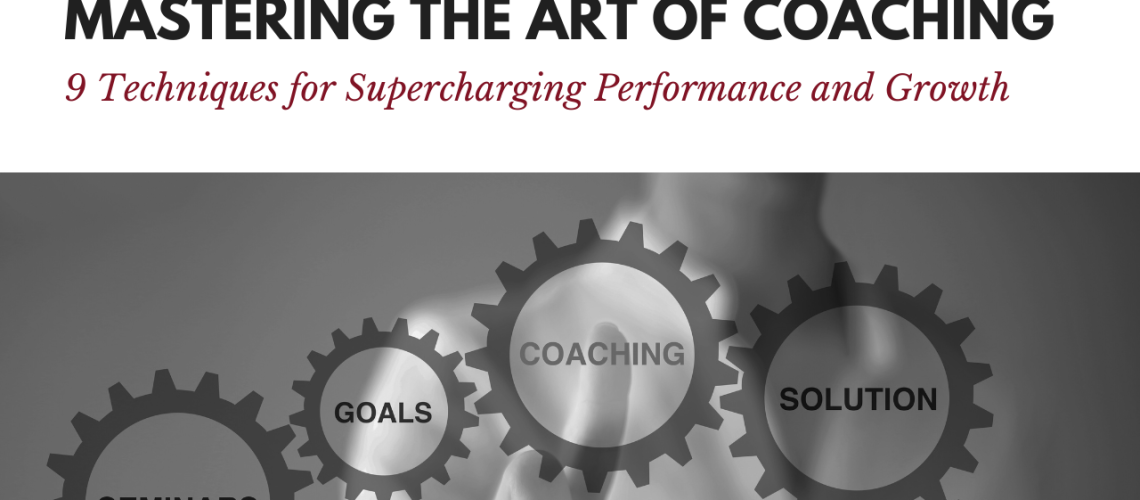By Dr. Salam Slim Saad
In the corporate corridors of a prominent firm in Dubai, set against a background of impressive skyscrapers I had the pleasure of conversing with Mr. Mohammad, a rising business star. As we savored aromatic Arabic coffee, he recounted his ascent in the business domain . Interestingly, it wasn’t just his expertise or strategy that pushed him forward, but the guidance of a seasoned coach, he told me, “Many executives think about buying other companies to grow, but my coach introduced me a transformative perspective: improving how we work, getting the team on the same page, and making the most of our current staff”.
Our discussion with Mr. Mohammad wasn’t wasn’t just a random chit-chat.; it highlighted how coaching can really change things; his story shows how valuable coaching is for success.
His narrative sets the tone for this article. The methods and tips we’re going to discuss aren’t just ideas, but things that really work, like they did for Mr. Mohammad. By using these tips, you can unlock your hidden strengths and those of your team, creating winning moments that could someday match Mr. Mohammad’s success. Let his story be your inspiration, and let this article be your roadmap.
Mastering the art of coaching is more than just acquiring a skill; it’s the transformation that transforms raw potential into unparalleled success. For those charting their path in the complex corporate maze, coaching emerges as the inspiration that lightens the path, the craftsman that shapes hidden talent, and the spark that fuels solid progress. It is the bridge that seamlessly connects ambition with realized achievement.
So, armed with this understanding and insight, here are nine techniques to supercharge performance and growth!
1- Building Trust and Rapport
Trust is the bedrock upon which effective coaching is built. Without it, the coaching relationship can be shallow, ineffective, and unproductive. Clients must believe that their coach genuinely has their best interests at heart. This trust is built through consistent actions, open communication, and a genuine commitment to the individual’s success.
Active listening plays an integral role in building trust. It involves truly hearing and understanding what the client is saying, asking probing questions, and avoiding distractions. Demonstrating empathy, understanding their perspectives, challenges, and concerns further cements the bond of trust. And perhaps most importantly, trust is strengthened when a coach consistently delivers on promises and maintains confidentiality.


2- Goal Setting and Clarity
Goal setting is at the heart of the coaching process. It provides a roadmap for the journey, offering both direction and a measure of success. However, for goals to be effective, they need to be clear, measurable, and aligned with the individual’s values and aspirations.
The SMART framework (Specific, Measurable, Achievable, Relevant, Time-bound) is a handy tool that coaches can utilize. This framework ensures that goals are not just lofty ideals but are grounded in reality and actionable steps. It’s also essential to regularly review and adjust these goals as circumstances and aspirations evolve.
3- Active Listening and Communication
Beyond building trust, active listening is crucial for understanding the nuances of a client’s situation, aspirations, and challenges. A coach’s primary role isn’t to provide solutions but to guide individuals in finding solutions for themselves.
Active listening involves more than just hearing words. It’s about interpreting the emotions, understanding the unsaid, and reading between the lines. Maintaining eye contact, nodding in agreement, and mirroring emotions are all techniques that can enhance communication. By using open-ended questions, a coach can also draw deeper insights and reflections from the client.


4- Constructive Feedback
Feedback, when given correctly, can be a catalyst for growth. It helps identify areas of improvement, reinforces good behavior, and guides the developmental journey. The “Feedback Sandwich” method, which involves sandwiching constructive feedback between two positive remarks, is a popular and effective technique. This method ensures that individuals remain receptive and motivated, even when addressing areas of concern.
However, the key to effective feedback is specificity. General remarks can leave individuals confused and demotivated. Instead, focusing on specific behaviors and outcomes, coupled with recommendations for improvement, makes feedback actionable.
5- Empowerment through Self-awareness
Empowerment stems from knowledge, specifically, knowledge of oneself. By promoting self-awareness, coaches can empower individuals to make informed decisions aligned with their core values and strengths.
Tools like the SWOT analysis (Strengths, Weaknesses, Opportunities, Threats) can be beneficial in this process. Additionally, coaches can engage clients in reflective exercises, journaling, and deep discussions about their values, motivations, and aspirations. This self-awareness not only drives decision-making but also boosts confidence and resilience.


6- Overcoming Resistance
Resistance can manifest in various ways—skepticism, procrastination, or even outright refusal. It’s a natural reaction to change or perceived criticism. Rather than confronting it head-on, coaches should acknowledge the feelings behind the resistance.
Empathy plays a crucial role here. By understanding the root of resistance, coaches can collaboratively address concerns, making the coaching process more inclusive and effective. Recognizing small wins and celebrating progress also helps in mitigating resistance.
7- Accountability and Monitoring
Accountability is the bridge between intention and action. By holding clients accountable, coaches ensure that goals are not just set but pursued with vigor. This involves setting clear expectations, maintaining regular check-ins, and adjusting strategies based on progress.
While accountability is key, it should never manifest as pressure or judgment. Instead, it’s a partnership where both parties are committed to a shared vision of success.


8- Motivation and Inspiration
A coach’s role extends beyond guiding and advising; it also involves motivating and inspiring. This can be achieved by continuously connecting individual goals to broader values and aspirations. Celebrating even small achievements can have a significant impact on motivation. Additionally, introducing clients to inspirational content, books, or seminars can provide that extra spark of inspiration.
9- Continuous Learning and Improvement
For a coach to remain effective, continuous learning is essential. The world is ever-evolving, and so are the challenges and aspirations of individuals. By investing in education, seeking feedback, and collaborating with peers, coaches can ensure they remain at the forefront of their profession. Adopting a growth mindset and being receptive to new ideas and techniques ensures that a coach can provide the best support to their clients.

To leave you with a thought that summarizes the spirit of coaching, consider the words of Benjamin Franklin: “Tell me and I forget, teach me and I may remember, involve me and I learn.”
Several years ago, I had the privilege of mentoring Layla, a young professional. When we first met, Layla was struggling with confidence and often second-guessed her abilities. One day, after a particularly challenging meeting, Layla expressed her doubts about her potential in the industry. Instead of merely offering advice, I decided to involve her in a project that was slightly beyond her current skill level. We worked side by side for weeks, with Layla taking the lead while I provided guidance when necessary. The experience wasn’t about teaching her every detail but allowing her to immerse herself in the process, face challenges, and find her own solutions. Months later, Layla led a similar project independently, not only showcasing her improved skills but also radiating newfound confidence.
As leaders and coaches, our role is not just to instruct but to deeply involve, engage, and inspire. It is in this profound connection that true growth takes place. Through involvement, Layla wasn’t just taught; she truly learned, evolved, and soared.
Challenge yourself every day to be that spark that ignites change in others. Happy coaching!



